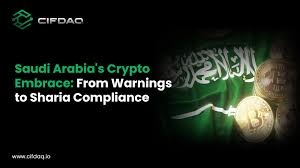Saudi Arabia, the oil-rich powerhouse of the Middle East, is at a crossroads when it comes to cryptocurrency. As digital currencies like Bitcoin and Ethereum surge globally, the Kingdom’s stance remains a blend of skepticism, regulatory restraint, and cautious exploration. What’s driving this complex relationship, and could Saudi Arabia be warming up to the crypto wave? Let’s dive into the sands of this evolving story as of March 27, 2025.
A History of Hesitation
Saudi Arabia’s journey with cryptocurrency kicked off with a firm “no thanks.” Back in 2018, the Saudi Arabian Monetary Authority (SAMA), the Kingdom’s central bank, declared trading in Bitcoin and other digital currencies illegal. The reasoning? High risks, wild volatility, and a lack of government oversight—red flags for a nation that prizes economic stability. SAMA warned citizens against chasing the “illusion” of crypto riches, and banks were banned from touching these assets.
The message was clear: crypto was a gamble not worth taking.
Fast forward to 2019, and the Ministry of Finance doubled down, cautioning against virtual currencies claiming ties to the Kingdom. No protections, no recourse—if you lost your shirt trading crypto, you were on your own. This hardline stance wasn’t unique; neighbors like Qatar went even further with outright bans. But beneath Saudi Arabia’s stern facade, a different tune was starting to hum.
Blockchain Yes, Crypto Maybe
While crypto trading got the cold shoulder, blockchain—the tech powering those digital coins—caught the Kingdom’s eye. Vision 2030, Saudi Arabia’s ambitious plan to diversify beyond oil, spotlighted tech innovation as a cornerstone. In 2019, SAMA teamed up with the UAE to pilot Aber, a digital currency for cross-border bank transactions—proof that the Kingdom wasn’t anti-digital, just anti-unregulated chaos. That same year, Ripple inked a deal with SAMA to boost payment tech, and by 2022, the Saudi British Bank joined R3’s blockchain ecosystem. The vibe? Blockchain’s a keeper; crypto’s still suspect.
Then came a twist in October 2022: SAMA tapped Mohsen AlZahrani, a fintech veteran, to lead its virtual assets and central bank digital currency (CBDC) program. Was this a sign of a thaw? Analysts buzzed—appointing a “Crypto Chief” hinted at a shift, even if the focus was more on controlled CBDCs than decentralized wildcards like Bitcoin.
The People vs. The Policy
Here’s where it gets juicy: despite the official chill, Saudis are diving into crypto. A 2022 KuCoin report pegged 3 million Saudis—nearly 15% of adults—as crypto investors, with 76% of investors jumping in over the past six months, per later surveys. Young, tech-savvy Saudis earning over 30,000 riyals monthly are leading the charge, while the over-45 crowd lags behind. Platforms like BitOasis and Rain, though operating in a gray zone, keep the crypto flame alive in the Kingdom.
This grassroots enthusiasm clashes with the top-down caution. The government won’t tax crypto earnings—because it doesn’t recognize them as legit—leaving traders in a quasi-legal limbo. No penalties are enforced, and exchanges chug along, but the lack of a clear framework keeps risks high. It’s a classic case of policy trailing passion.
Shariah and the Crypto Question
Religion adds another layer. Saudi Arabia, a bastion of Islamic finance, grapples with whether crypto is halal (permitted) or haram (forbidden). Some scholars, like Sheikh Assim al-Hakeem in 2017, called Bitcoin gambling—too volatile, too anonymous, an “open gate” for illicit cash. Others see potential if tied to real assets. A 2024 fatwa from a prominent cleric deemed Bitcoin Shariah-compliant, sparking hope among investors. Still, consensus is elusive, and the debate mirrors the Kingdom’s broader crypto tug-of-war.
Signs of a Shift?
Lately, the tea leaves suggest change. The Public Investment Fund (PIF) has dipped toes into blockchain via stakes in crypto-friendly firms, though no direct Bitcoin buys are confirmed. NEOM, Saudi Arabia’s futuristic mega-city, partnered with Animoca Brands in 2023 to push Web3, and the Capital Market Authority is reportedly eyeing crypto rules by year-end 2025. Rumors of Saudi royals or the PIF hoarding billions in BTC/ETH swirl on X, but official statements—like Kingdom Holding’s January 2025 denial—pour cold water on the hype.
Globally, the UAE’s crypto hub status and the U.S.’s regulatory dance with digital assets might nudge Saudi Arabia along. A young population, a diversifying economy, and a thirst for tech could tip the scales. Experts like Fiorenzo Manganiello argue the Kingdom’s cheap energy makes it a crypto-mining goldmine—if only the rules catch up.
Where’s This Heading?
Saudi Arabia’s crypto stance is a paradox: wary yet intrigued, restrictive yet restless. For now, it’s a “quasi-legal” zone—trading’s discouraged but not outright punished, adoption’s booming but unprotected. Will the Kingdom follow Dubai’s lead and regulate, or stick to its cautious guns? The appointment of AlZahrani and blockchain bets suggest a slow pivot, but don’t expect a Bitcoin bonanza just yet.
As of March 27, 2025, Saudi Arabia’s watching the crypto world with one eye open—curious, calculating, and not quite ready to leap. For investors, it’s a waiting game; for the Kingdom, it’s a balancing act between tradition and tomorrow. Stay tuned—this desert tale’s still unfolding.







